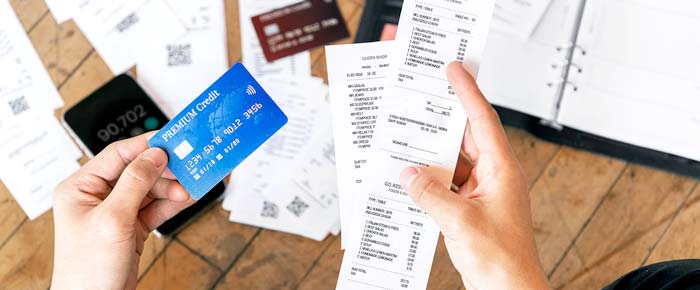Managing your credit cards is paramount to keeping your finances healthy and staying on track to achieving your financial goals.
We’re offering our top 10 tips to better manage your credit cards so you can make the most of these nifty financial tools while maintaining a perfect credit score.
#1) Don’t have too many credit cards
The more credit cards you have, the more fees and minimum repayments you have to keep up with. That being said, in addition to making management harder, having too many may cause you to appear, on your credit file, that you are over extended.
They may also tempt some to use more credit than they can comfortably afford to repay. In addition, since most credit cards come with annual fees and interest, more credit cards means increased costs.
It is important to therefore keep the number of credit cards that you have to a minimum. If, however, you feel that you have too many, it may not be ideal to close a number of them off at once as this will drop your credit score. Rather cancel them systematically starting with the one that you use the least.
#2) Always keep up with minimum repayments
When you take out a credit card, you will be offered a credit limit and your minimum repayments will be based on how much of this limit you’ve made use of, as well as your interest rate. Your minimum payment will always be 1% of the balance or more.
That being said, making just a minimum repayment on balance will always drag your debt for a long time. The longer you have an outstanding credit card balance, the more you'll pay overall. It's therefore a good idea to consider paying more than the required minimum.
#3) Automate minimum credit card repayments
Having to manually pay your credit cards each and every month is a thing of the past. You do not need to worry about missing your minimum payments if you automate the task. To do this you simply need to log into your online banking and set it up.
Remember to ensure your repayments are withdrawn when there will be credit in your transactional account. You can also set up a direct debit to withdraw the full credit card balance, as opposed to just the minimum, depending on what you prefer.
#4) Be wary of annual fees, interest rates & introductory offer periods
Knowing your credit cards, the fees they carry, the interest rate, introductory offer periods and, other important information, is paramount to making the most of your credit card and, remaining within the limits set out in your credit agreement. If you have multiple credit cards, you may want to make a note of all the different details for each card in one place so that you can review it when needed.
That said, when it comes to 0% interest periods, it's crucial that you know the terms which you are bound to maintain this interest free credit, the minimum required repayments as well as the revert rate. If you fail to meet your obligation, the introductory period will automatically be cancelled and the interest rate will revert to the revert rate which, may be quite high.
#5) Do not take out credit cards for rewards
Credit card providers all have their own rewards programs and many of these are advertised extensively and are usually the reason people take out a certain credit card.
Rewards may be attractive, particularly if you shop with a certain retailer that has partnered with your credit card provider, however, these rewards are typically covered by the fees and interest you pay on a credit card. This means that the more appealing the rewards, the more you will likely pay in the form of fees and interest.
#6) Choose a credit card that suits your spending habits & needs
There are many types of credit cards that serve to offer rewards, cash back low rates and low annual fees among others. You can also get balance transfer and credit builder cards which are designed to resolve very specific problems.
By having a good idea of what your spending habits are, you will be in a position to decide which option will suit you best. Those that tend to repay their credit cards in full can benefit from low fee credit cards that have a higher interest rate. Those that tend to make a minimum repayment only will benefit more from low rate offers.
#7) Always download & review your statements
Banks make mistakes. Fraud happens. It is therefore imperative that you download and review your credit card statements on a regular basis. So what exactly are we looking for when we download a bank statement?
Firstly, you need to check that you made all of the transactions listed and, that each of these reflect the correct amount. Make sure there are no duplicate payments. You also need to check fees and interest and ensure these are calculated correctly.
#8) Avoid drawing cash & cash advances
Withdrawing cash from your credit card is one of the most expensive credit card mistakes people make. Rather than drawing cash, always swipe or pay online using your card.
Transferring cash from your credit card to your transactional account is also considered a cash advance and, will attract high fees. Most short-term loans will be cheaper in terms of interest than such credit card cash advances and cash withdrawals so avoid them at all costs.
#9) Consider requesting a lower interest rate
If you’ve had your credit card for a while and have been keeping up with your repayments you may be in a position to request a lower interest rate. Although this isn’t something that credit card providers do often, if you’re willing to call them up and discuss the possibility you may be pleasantly surprised.
They may not necessarily reduce your rate by much but every small amount counts and may make a substantial difference in the long time. If you’re having trouble making your credit card repayments, you should also contact your provider and see if they would consider restructuring or reducing your payment until you are back on your feet.
#10) Use a balance transfer card to pay off balances at 0% interest
Balance transfer credit cards can offer you 0% interest for a certain period within which you can repay high interest balances and save. These are nifty tools which are available from most banks and providers. You must remember, however, that the interest free period will expire after a given time and, that the revert rate is generally quite high.
To avoid this high interest, you must pay off your balance before the period ends. You should also never use a balance transfer card to make purchases as this will attract a high interest rate and any payments made will go towards paying off this balance rather than the consolidated balance.



